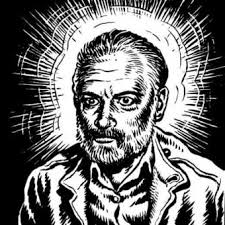#32 Minority Report- Philip K. Dick
I have always been a fan of sci-fi but never a true SCI-FI
FAN. What I mean, is that I’ve always
liked what I read but was far from knowledgeable about the genre, or its deep history and influence over culture and
technology. For example, when I was in
high school I volunteered to do a verbal presentation about the history of
robots, but I still have never read nor seen genre classics like Dune…gasp, I
know!
BTW, here’s a fun fact I remember from that 10th
grade report: did you know that Czech Sci-Fi writer Karel Capek invented the
word Robot in his 1920 story Rossum’s Universal Robots (of course the concept of
robots came much earlier). "Robot" became only the 2nd Czech word to
enter the English language. Can you name the first? *see answer below
This past year I’ve been reading many SF authors new to me,
and of course P.K.Dick is one of those legendary names. For this project, I begin with a collection
of short fiction called Minority Report.
I will not compare or mention outside of this paragraph the movie made
from this tale, one of three huge blockbusters based on Dick’s work. Not that this Tom Cruisiest of Tom Cruise
movies doesn’t warrant a watch, just that this is a blog about the written
word. So by all means have at the film if you wish.
Minority Report posses a classic moral discussion, and one played
out in law enforcement and military engagements throughout time…the difference
between preventive and pre-emptive action. If you could view the future and see
someone commit a crime before it happens, is that person guilty of that crime
deserving of punishment? The world of
the MR amazingly has a pre-cognitive program with time-viewing abilities and
has answered that question in the resounding affirmative. And it works!
“In our society we have no major crimes…but we do have a
detention center full of would-be criminals.”
There are two ways laws generally work. They’re either coercive or punitive. If you refuse to talk to a grand jury for
example, you are locked up until you do. That’s coercive. If you steal
somebody’s car you are also locked up as punishment, that’s punitive. The pre-cog program, by its mere existence is
somehow both purely coercive and purely punitive. This world has rid itself of 99.8% of all
violent crime, but still has a prison full of people locked up. How can you
punish someone for a crime if it was stopped before it happens? That’s where
the fun begins.
Since the precog program KNOWS that someone will break the
law, that person already HAS broken the law.
The concept of space-time is always fascinating, and making crime
prevention the centerpiece of this mind experiment is brilliant.
Unfortunately, readers wanting an in depth discussion
into metaphysics are distracted by the story of a power struggle between the
two entities that share the precog information. The military wishes to prove
that by telling the future criminal the details of their future crime, they
change the very existence of that crime.
More importantly, that even the precogs can get it wrong sometimes, and
if you can’t actually predict the future 100%, you can’t doll out punishment
absolutely…what a concept? (heavy
sarcastic tone)
There are obvious large holes in this story. Precogs can
predict someone cheating on their taxes but not the chief of police being
framed or a massive military coup? Pre-crime has gotten rid of all violent
crime but guns still exist? With the two parties who can see the future
fighting it out, shouldn’t the future-reading abilities spin off into some
crazy feedback loop of prediction?
I would have loved to see more discussion about preemptive
vs. preventive law enforcement, or seen a larger look at The Theory of Multiple
Futures which outlines the concept of the Minority Report.
The largest cloud looming over this story, or at least
should be is this obvious question: Why
not just lock people up for the period when the future crime was supposed to be
committed, then let them go? I guess we're supposed to assume this society has already had this discussion. Fine, then how does a society that allows for zero
tolerance on thought-crimes, let the one guy who did commit an actual murder
NOT get locked up in the end?
The concepts here are amazing, the story engaging, and the
legacy of this work is clear, but in pure story-crafting terms, the execution
was somewhat lacking. But that shouldn’t take away the impact that it has had
on the genre.
Notable Passages: “Perhaps he was trapped in a closed,
meaningless time circle with no motive and no beginning.”
Been there!
“With eyes glazed blank, it contemplated a world that did not
yet exist, blind to the physical reality that lay around it.”
Yup…been there too!
*Answer to question: The first Czech word to enter the English language is
Pistol. Although minor etymology
disputes sometimes claim the word arises from French or German words, most
historians side with it originating in the Czech language.


